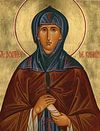

| Previous day | Next day |
| Old Style
February 6
|
Saturday |
New Style
February 19
|
| Fast-free Week. Tone 1. | No fast.
|
![]() St. Bucolus, bishop of Smyrna (ca. 100).
St. Bucolus, bishop of Smyrna (ca. 100).
Virgin-martyr Dorothea, and with her Martyrs Christina and Callista, sisters, and Theophilus, at Caesarea in Cappadocia (288-300). Virgin-martyr Fausta, and with her Martyrs Evilasius and Maximus, at Cyzicus (305-311). Martyr Julian of Emesa (312). Sts. Barsanuphius the Great and John the Prophet, monks of Gaza (6th c.). St. Photius, patriarch of Constantinople (891). Virgin-martyrs Martha and Mary and their brother Lycarion at Tanis (Hermopolis) in Egypt. St. Dorothea, schemanun, of Kashin (1629).
New Hieromartyr Dimitry Rozhdestvensky, archpriest, of Verny, and his son New Martyr Anatole (1922). New Hieromartyr Basil Nadezhnin, priest, of Moscow (1930).
St. James, ascetic, of Syria (ca. 460). St. Mael, bishop of Ardagh (488), disciple of St. Patrick. St. Vedast, bishop of Arras (540). St. John of Thebes, monk of Palestine (6th c.) St. Amand, apostle of Maastricht (675). St. Arsenius of Iqalto, Georgia (1127).
Repose of Archbishop Theophan (Bystrov) of Poltava (1940).
Thoughts for Each Day of the Year
According to the Daily Church Readings from the Word of God
By St. Theophan the Recluse

310
Saturday. [II Tim. 3:1–9; Luke 20:45–21:4]
Who are those having a form of godliness, but denying the power thereof? (II Tim. 3–5). Who are those others, ever learning, and never able to come to the knowledge of the truth? (II Tim. 3:7). The former are those who maintain all the external routines in which a godly life is manifested, but who do not have a strong enough will to maintain their inner dispositions as true godliness demands. They go to church and stand there readily. But they do not make the effort to stand with their mind before God continuously and to reverently fall down before Him. Having prayed a bit, they release the reins of the control of their mind; and it soars, circling over the entire world. As a result, they are externally located in church, but by their inner state they are not there: only the form of godliness remains in them, while its power is not there. You must think about everything else in this manner.
The latter are those who, having entered the realm of faith, do nothing but invent questions—“What is this? What is that? Why this way? Why that way?” They are people suffering from empty inquisitiveness. They do not chase after the truth, only ask and ask. And having found the answer to their questions, they do not dwell on them for long, but soon feel the necessity to look for another answer. And so they whirl about day and night, questioning and questioning, and never fully satisfied with what they learn. Some people chase after pleasures, but these chase after the satisfaction of their inquisitiveness.
Articles
 St. Bucolus the Bishop of SmyrnaSaint Bucolus, Bishop of Smyrna, was a disciple of the holy Apostle and Evangelist John the Theologian, and became the first Bishop of Smyrna (Asia Minor). |
 Virginmarty Fausta at CyzicusThe girl bravely confessed her faith and was subjected to many cruel tortures. |
 Martyr Evilasius at CyzicusSaint Evilasius was an eighty-year-old pagan priest who was ordered to turn Saint Fausta away from Christ. |
 Martyr Maximus at CyzicusThe eparch Maximus was sent to investigate the case of Saints Fausta and Evilasius for the emperor, and he began to torture the old man who had come to believe in Christ. |
 Martyr Julian of EmesaHe was a skilled physician, and healed illnesses not only of the body but also of the soul, and he converted many people to faith in Christ the Savior. |
 Venerable John the ProphetSaint John, a disciple of Saint Barsanuphius, lived in a cell outside the monastery of Abba Seridus for eighteen years until his death. |
 St. Arsenius of Iqalto in GeorgiaSaint Arsen of Iqalto was a translator, researcher, compiler of manuscripts, hymnographer, philosopher, and a great defender of the Georgian Christian Faith. |









